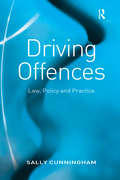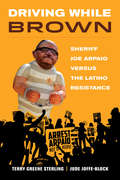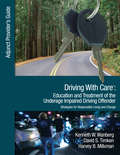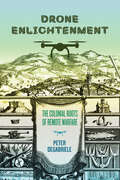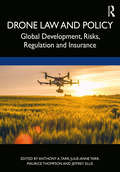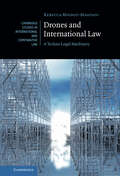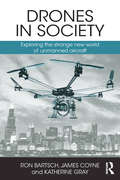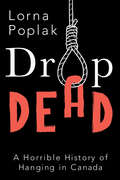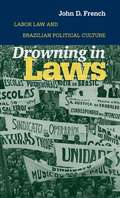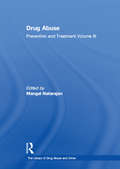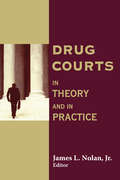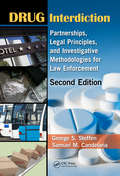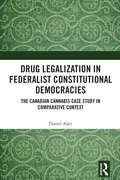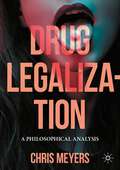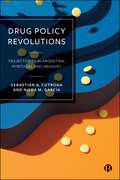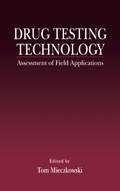- Table View
- List View
Driving Offences: Law, Policy and Practice
by Sally CunninghamThis volume examines general driving offences, concentrating on those which punish risk-taking whilst driving, with the primary goal of increasing road safety. The focus is particularly on careless driving, dangerous driving, drink-driving and speeding, with a comparative approach incorporated into the discussion. Drawing on legal and psychological research, the book explains the legal definition of offences, discussing the policy behind the offences and examines how the law is applied in practice. It concludes with consideration of how the law in this area might be reformed - informed by the preceding discussion. This title will be a valuable resource tool for students, academics and practitioners working in the area of road safety.
Driving While Brown: Sheriff Joe Arpaio versus the Latino Resistance
by Terry Greene Sterling Jude Joffe-BlockHow Latino activists brought down powerful Arizona sheriff Joe ArpaioJournalists Terry Greene Sterling and Jude Joffe-Block spent years chronicling the human consequences of Sheriff Joe Arpaio’s relentless immigration enforcement in Maricopa County, Arizona. In Driving While Brown, they tell the tale of two opposing movements that redefined Arizona’s political landscape—the restrictionist cause embraced by Arpaio and the Latino-led resistance that rose up against it.The story follows Arpaio, his supporters, and his adversaries, including Lydia Guzman, who gathered evidence for a racial-profiling lawsuit that took surprising turns. Guzman joined a coalition determined to stop Arpaio, reform unconstitutional policing, and fight for Latino civil rights. Driving While Brown details Arpaio's transformation—from "America’s Toughest Sheriff," who forced inmates to wear pink underwear, into the nation’s most feared immigration enforcer who ended up receiving President Donald Trump’s first pardon. The authors immerse readers in the lives of people on both sides of the battle and uncover the deep roots of the Trump administration's immigration policies.The result of tireless investigative reporting, this powerful book provides critical insights into effective resistance to institutionalized racism and the community organizing that helped transform Arizona from a conservative stronghold into a battleground state.
Driving With Care: An Adjunct Provider's Guide to Driving With Care: Education and Treatment of the Impaired Driving Offender--Strategies for Responsible Living and Change
by Dr Harvey B. Milkman Dr Kenneth W. Wanberg David S. TimkenDriving with Care: Education and Treatment of the Underage Impaired Driving Offender is a supplementary guide for the Driving with Care Series. It deals specifically with Adolescent/young adult impaired driving, which presents a host of special challenges and special treatment issues. Underage impaired driving represents 15% of the DUI arrests nationwide, which translates into roughly 150,000 individuals a year. Underage drivers present a special challenge for education and treatment as their motivation to drink and drive is often quite different from the adult offender. Thus, the authors have compiled a rich set of educational protocols and treatment strategies that can supplement the various levels of treatment provided in all three Driving with Care workbooks. Section I provides a theoretical foundation for understanding underage impaired driving, including the scope, incidence, and prevalence of the problem and defines the causal and risk factors associated with underage drinking and driving. It also defines and covers legal and regulatory interventions that have been effective for treatment and provides guidelines that enhance the treatment and rehabilitation of this group. Section II provides specific guidelines and enhancements for the delivery of DWC for underage drivers, including activities, handouts, and various assessment tools.SAGE offers treatment and training programs for mental health providers that you can easily incorporate into your existing programs. Visit www.sagepub.com/satreatments to learn more about these treatment and training programs.
Drone Enlightenment: The Colonial Roots of Remote Warfare
by Peter DeGabrieleDrone warfare raises far-reaching questions about responsibility, war, and sovereignty. Who can be held accountable for drone strikes? Do drones conduct wars of national territories and sovereign boundaries? What does the occupation of a land or people look like if there are no boots on the ground? Focusing specifically on the United States' use of killer drones during the War on Terror, Drone Enlightenment argues that this kind of warfare has its intellectual, ideological, and practical roots in the way the Enlightenment imagined moral agency, occupation, race, and sovereignty. As a consequence of seeing drone warfare as a creature of the Enlightenment, and through innovative readings of Hobbes, Locke, Grotius, Pufendorf, Barbeyrac, and Swift, the book also reevaluates the Enlightenment itself.
Drone Law and Policy: Global Development, Risks, Regulation and Insurance
by Anthony A. Tarr; Julie-Anne Tarr; Maurice Thompson; Jeffrey EllisDrone Law and Policy describes the drone industry and its evolution, describing the benefits and risks of its exponential growth. It outlines the current and proposed regulatory framework in Australia, the United States, the United Kingdom and Europe, taking into consideration the current and evolving technological and insurance landscape. This book makes recommendations as to additional regulatory and insurance initiatives which the authors believe are necessary to achieve an effective balance between the various competing interests. The 23 chapters are written by global specialists on crucial topics, such as terrorism and security, airport and aircraft safety, maritime deployment, cyber-risks, regulatory oversight, licensing, standards and insurance. This book will provide authoritative reference and expert guidance for regulators and government agencies, legal practitioners, insurance companies and brokers globally, as well as for major organisations utilising drones in industrial applications.
Drone and UAV Forensics: A Hands-On Approach
by Kim-Kwang Raymond Choo Hudan StudiawanThis textbook is designed to introduce and deepen the understanding of drone technology in the field of forensic science. It is tailored for university-level courses, blending theoretical knowledge with practical application. This makes it an ideal resource for advanced-level students in digital forensics, computer science, criminal justice, and related fields. Real-world case studies are designed throughout the text, providing practical insights, and demonstrating how the principles and techniques discussed can be applied in actual forensic investigations. This hands-on approach not only aids in understanding theoretical concepts but also provides valuable practical experience. This textbook not only focuses on current practices in drone forensics, but also discusses the future challenges and advancements expected in the field. This forward-thinking approach ensures that readers are not only well-versed in current methodologies but are also prepared for emerging technologies and evolving legal landscapes. This aspect makes the textbook a long-term resource for students and researchers interested in or working in drone forensics.
Drones and International Law: A Techno-Legal Machinery (Cambridge Studies in International and Comparative Law)
by Rebecca Mignot-MahdaviThrough an analysis of the use of drones, Rebecca Mignot-Mahdavi explores the ways in which, in the context of counterterrorism, war, technology and the law interact and reshape one another. She demonstrates that drone programs are techno-legal machineries that facilitate and accelerate the emergence of a new kind of warfare. This new model of warfare is individualized and de-materialized in the sense that it focuses on threat anticipation and thus consists in identifying dangerous figures (individualized warfare) rather than responding to acts of hostilities (material warfare). Revolving around threat anticipation, drone wars endure over an extensive timeframe and geographical area, to the extent that the use of drones may even be seen, as appears to be the case for the United States, as part of the normal functioning of the state, with profound consequences for the international legal order.
Drones and Unmanned Aerial Systems
by Aleš ZavršnikThis book tackles the regulatory issues of Unmanned Aerial Systems (UAS) or Remotely-Piloted Aerial Systems (RPAS), which have profound consequences for privacy, security and other fundamental liberties. Collectively known as "drones," they were initially deployed for military purposes: reconnaissance, surveillance and extrajudicial executions. Today, we are witnessing a growth of their use into the civilian and humanitarian domain. They are increasingly used for goals as diverse as news gathering, aerial inspection of oil refinery flare stacks, mapping of the Amazonian rain-forest, crop spraying and search and rescue operations. The civil use of drones is becoming a reality in the European Union and in the US. The drone revolution may be a new technological revolution. Proliferation of the next generation of "recreational" drones show how drones will be sold as any other consumer item. The cultural perception of the technology is shifting, as drones are increasingly being used for humanitarian activities, on one hand, but they can also firmly be situated in the prevailing modes of postmodern governance on the other hand. This work will be of interest to researchers in Criminology and Criminal Justice interested in issues related to surveillance, security, privacy, and technology. It will also provide a criminological background for related legal issues, such as privacy law, aviation law, international criminal law, and comparative law.
Drones in Society: Exploring the strange new world of unmanned aircraft
by Ron Bartsch James Coyne Katherine GrayThe integration of drones into society has attracted unprecedented attention throughout the world. The change, for aviation, has been described as being equally as big as the arrival of the jet engine. This book examines the issues that surround this change, for our society and the legal frameworks that preserve our way of life. Drones in Society takes the uninitiated on a journey to understand the history of drones, the present day and the potential future in order to demystify the media hype. Written in an accessible style, Drones in Society will appeal to a broad range of interested readerships, among them students, safety regulators, government employees, airspace regulators, insurance brokers and underwriters, risk managers, lawyers, privacy groups and the Remotely Piloted Aircraft System (RPAS) industry generally. In a world first, this book is a light and interesting read; being both relatable and memorable while discussing complex matters of privacy, international law and the challenges ahead for us all.
Drones in the African Battlespaces (Southern Space Studies)
by Wayne Stephen Coetzee Dries PutterThis book, a collaborative endeavour by experts from various disciplines, meticulously investigates the increasing reliance on drones in conflicts across Africa, delving into their geopolitical, tactical, and ethical ramifications. By emphasising African perspectives, it examines the distinct dynamics of the region, highlighting the interactions between state actors, non-state actors, and external powers. The contributions explore the proliferation of armed and unarmed drones and their deployment by violent non-state actors alongside the rise of indigenous drone manufacturing. Topics include counterterrorism, sovereignty, and regional stability. The analysis is enriched with in-depth case studies, offering a nuanced understanding of the tactical, operational, and strategic implications of drones in African battlespaces. The book underscores the potential of drones to address Africa's unique security challenges, such as irregular warfare and porous borders, while also raising ethical concerns related to surveillance, civilian casualties, and dual-use technologies. Drones in the African battlespaces provide a timely, comprehensive examination of how unmanned systems are reshaping warfare and security across the continent, inviting policymakers, researchers, and practitioners to critically engage with the implications of this technological shift for Africa&’s future.
Drop Dead: A Horrible History of Hanging in Canada
by Lorna PoplakShining a light on the dark history of hangings in Canada. Take a journey through notable cases in Canada’s criminal justice history, featuring well-known and some less-well-known figures from the past. You'll meet Arthur Ellis, Canada’s most famous hangman, whose work outfit was a frock coat and striped trousers, often with a flower pinned to his lapel. And you will also encounter other memorable characters, including the man who was hanged twice and the gun-toting bootlegger who was the only woman every executed in Alberta. <p><p> Drop Dead: A Horrible History of Hanging in Canada illustrates how trial, sentencing, and punishment operated in Canada’s first century, and examines the relevance of capital punishment today. Along the way, learn about the mathematics and physics behind hangings, as well as disturbing facts about bungled executions and wrongful convictions.
Dropsy, Dialysis, Transplant: A Short History of Failing Kidneys (Johns Hopkins Biographies of Disease)
by Steven J. PeitzmanSmall and bean shaped, the kidneys are sophisticated organs that filter waste from the blood. A number of diseases and disorders—including diabetes and hypertension—can harm the kidneys and cause them to fail.Historian and nephrologist Steven J. Peitzman traces the medical history of kidney disease alongside the personal experience of illness. Drawing on diaries, letters, literary narratives, and scientific writings, Peitzman charts the triumphs of medical innovators like Richard Bright, Thomas Addis, and Belding Scribner as well as the stories of persons, famous and not, who have struggled with the disease. Conditions once known as "Bright’s Disease" are now recognized as complex disorders with names such as glomerulopathy and acute tubular necrosis. Treatments have evolved from abdominal tapping and dietetics to hemodialysis and transplantation. Medical advances have improved the well-being and prognosis of persons with failing kidneys. Yet such persons continue on an arduous journey of chronic illness. Peitzman travels with them, from diagnosis to treatment, and witnesses their remarkable ability to cope.Joining the clinician’s perspective with the historian’s analysis, this fascinating chronicle offers insight into how diseases are defined, categorized, and understood and explains current concepts of how kidney disease behaves and how modern therapy works.
Drowning in Laws
by John D. FrenchSince 1943, the lives of Brazilian working people and their employers have been governed by the Consolidation of Labor Laws (CLT). Seen as the end of an exclusively repressive approach, the CLT was long hailed as one of the world's most advanced bodies of social legislation. In Drowning in Laws, John D. French examines the juridical origins of the CLT and the role it played in the cultural and political formation of the Brazilian working class.Focusing on the relatively open political era known as the Populist Republic of 1945 to 1964, French illustrates the glaring contrast between the generosity of the CLT's legal promises and the meager justice meted out in workplaces, government ministries, and labor courts. He argues that the law, from the outset, was more an ideal than a set of enforceable regulations--there was no intention on the part of leaders and bureaucrats to actually practice what was promised, yet workers seized on the CLT's utopian premises while attacking its systemic flaws. In the end, French says, the labor laws became "real" in the workplace only to the extent that workers struggled to turn the imaginary ideal into reality.
Drug Abuse: Volume III (The Library of Drug Abuse and Crime)
by Mangai NatarajanEver since the Shanghai convention in 1909, the threat posed to human well-being by drug abuse has led countries around the world to take action to deal with their drug problems. There are wide variations in the policies pursued, but most countries try to reduce both the supply of and the demand for drugs. Unfortunately, there is little research consensus on the respective merits of these two approaches or about the best ways to pursue them. Consequently, control and prevention policies are mostly driven by political considerations, economic realities and cultural expectations, though research has played an important part in formulating and evaluating treatments for drug addiction. This volume reviews studies on drug abuse prevention and treatment strategies under five main areas: 1. Reducing supply - strategies to control the flow of drugs from production to retail distribution; 2. Reducing demand - prevention of drug use at all stages of involvement and consumption levels; 3. Reducing harm - promoting situational risk reduction practices for regular users, addicts and recreational users; 4. Reducing addiction - drug treatment options for various groups in various settings; and 5. Drug policies and prescriptions - focused on debates about prohibition and legalization.
Drug Control and Human Rights in International Law
by Schabas Lines Richard Schabas William A. Richard LinesHuman rights violations occurring as a consequence of drug control and enforcement are a growing concern, and raise questions of treaty interpretation and of the appropriate balancing of concomitant obligations within the drug control and human rights treaty regimes. Tracing the evolution of international drug control law since 1909, this book explores the tensions between the regime's self-described humanitarian aspirations and its suppression of a common human behaviour as a form of 'evil'. Drawing on domestic, regional and international examples and case law, it posits the development of a dynamic, human rights-based interpretative approach to resolve tensions and conflicts between the regimes in a manner that safeguards human rights. Highlighting an important and emerging area of human rights inquiry from an international legal perspective, this book is a key resource for those working and studying in this field.
Drug Control and International Law (Routledge Research in International Law)
by Daniel WisehartThis book provides for an extensive legal analysis of the international drug control system in light of the growing challenges and criticism that this system faces. In the current debate on global drug policy, the central pillars of the international drug control system – the UN Drug Conventions as well as its institutions – are portrayed as outdated, suppressive and seen as an obstacle to necessary changes. The book’s objective is to provide an in-depth and positivist insight into drug control’s present legal framework and thus provide for a better understanding of the normative assumptions upon which drug control is currently based. This is attained by clarifying the objectives of the international drug control system and the premises by which these objectives are to be achieved. The objective of the current global framework of international drug control is the limitation of drugs to medical and scientific purposes. The meaning of this objective and its concrete implications for States’ parties as well as its problems from the perspective of other regimes of international law, most notably international human rights law, are extensively analysed. Additionally, the book focuses on how the international drug control system attempts to reach the objective of confining drugs to medical and scientific purposes, i.e. by setting up a universal system that exercises a rigid control on drug supply. The consequences of this heavy focus on the reduction of drug supply are outlined, and the book concludes by making suggestions on how the international drug control system could be reformed in the near future in order to better meet the existing challenges. The analysis occurs from a general international law perspective. It aims to map the international drug control system within a wider context of international law and to understand whether the problems that the international drug control system faces are exemplary for the difficulties that institutionalized systems of global scope face in the twenty-first century.
Drug Court for Young Offenders: A View from the Bench
by Cedric KernsWhat makes drug court programs different from traditional criminal courts? This e-book answers that question and details the model of Youth Offender (YO) Court, a unique family-focused drug court program designed to address the specific needs of young persons, ages 18 to 24, and their families-from the perspective of the presiding judge.
Drug Courts: In Theory and in Practice (Social Problems And Social Issues Ser. #14)
by Jr. NolanDrug courts offer offenders an intensive court-based treatment program as an alternative to the normal adjudication process. Begun in 1989, they have since spread dramatically throughout the United States. In this interdisciplinary examination of the expanding movement, a distinguished panel of legal practitioners and academics offers theoretical assessments and on-site empirical analyses of the workings of various courts in the United States, along with detailed comparisons and contrasts with related developments in Britain. Practitioners, politicians, and academics alike acknowledge the profound impact drug courts have had on the American criminal justice system. From a range of disciplinary perspectives, contributors to this volume seek to make sense of this important judicial innovation. While addressing a range of questions, Drug Courts also aims to achieve a careful balance between focused empirical studies and broader theoretical analyses of the same phenomenon. The volume maintains an analytical concentration on drug courts and on the important practical, philosophical, and jurisprudential consequences of this unique form of therapeutic jurisprudence.Drug courts depart from the practices and procedures of typical criminal courts. Prosecutors and defense counsel play much-reduced roles. Often lawyers are not even present during regular drug court sessions. Instead, the main courtroom drama is between the judge and client, both of whom speak openly and freely in the drug court setting. Often accompanying the client is a treatment provider who advises the judge and reviews the client's progress in treatment. Court sessions are characterized by expressive and sometimes tearful testimonies about the recovery process, and are often punctuated with applause from those in attendance. Taken together, the chapters provide a variety of perspectives on drug courts, and extend our knowledge of the birth and evolution of a new movement. Drug Courts<
Drug Interdiction: Partnerships, Legal Principles, and Investigative Methodologies for Law Enforcement, Second Edition
by George S. Steffen Samuel M. CandelariaAs drug trafficking and the abuse of illicit drugs continue to inflict untold harm upon our society, it is clear that a global initiative and an intense domestic strategy are vital to address the sophisticated drug trafficking organizations (DTOs) that are prevalent in many regions. Covering a wide array of domestic interdiction topics, Drug Interd
Drug Legalization in Federalist Constitutional Democracies: The Canadian Cannabis Case Study in Comparative Context
by Daniel AlatiThis book uses the Canadian Cannabis legalization experiment, analyzed in the historical context of wider drug criminalization in Canada, and placed in international perspective, to examine important lessons about the differential implementation of federal law in jurisdictions within federalist constitutional democracies. Utilizing a socio-legal, interdisciplinary methodology, the work provides a comprehensive history of federal drug policy and engages in a critical appraisal of its provincial implementation. It also presents a significant international and comparative component, bringing in analyses of the status of drug legalization in other federalist constitutional democracies. Readers of the book will thus gain a comprehensive knowledge of drug legalization in federalist constitutional democracies. They will also better understand the political and cultural factors that impact upon differential implementation of federal law in individual jurisdictions including, but not limited to, legacies of racism and stigmatization of drug use. Using the experience of Canada and other countries, future challenges and lessons to be learned for states considering federal drug legalization are analysed and explained. The book will be a valuable resource for students, academics and policy-makers in the areas of Criminal Law, Constitutional Law, Criminology, Socio-Legal Studies, Indigenous Studies, and Drug and Health Policy Studies.
Drug Legalization: A Philosophical Analysis
by Chris MeyersThis textbook introduces students to the various arguments for and against the prohibition of recreational drugs. The arguments are carefully presented and analyzed, inviting students to consider the competing principles of liberty rights, paternalism, theories of punishment, legal moralism, and the social consequences of drug use and drug laws. Meyers extends this examination by presenting alternatives to the prohibition/legalization dichotomy, including harm reduction, decriminalization, and user licensing or on-premise use. The presentation invites readers to think clearly about the reasons and principles that should determine public policy and law, while also delving into the deeper philosophical questions underlying the drug prohibition debate. Is it morally wrong to use drugs? If so, would that be reason enough to make it illegal? Are there good reasons in favor of using illicit drugs? Do addicts lack free will, and if so, would it be unjust to punish them? What is (or ought to be) the purpose of punishment? Is the state justified in limiting the freedom of competent adults for their own good? What should be the goal of drug policy, reduced use or reduced harm?The purpose of the book is twofold. First, it is a review of the arguments for and against drug prohibition, a useful tool for policy makers, activists, and concerned citizens with an understanding of the relevant considerations for determining how we should reform our failing drug policy. Second, the book serves as a case study in the deeper issues of justice, the nature of law, rights and liberties, and the public good. Students studying applied ethics, political science, or public policy will benefit greatly from Meyers' approach.
Drug Policy Revolutions: Trajectories in Argentina, Portugal, and Uruguay
by Sebastián A. Cutrona Nilda M. GarcíaCoinciding with a wave of drug policy liberalization around the world, this book analyzes the experiences of Argentina, Portugal, and Uruguay in their efforts at depenalization, decriminalization, and legalization/regulation of recreational drugs. The authors present the successes and challenges of the approaches and their impacts on drug use, public health, and security, debunking some of the myths surrounding flexible drug policies along the way. Contrasting the three liberalization cases with the criminalization approach of the US at federal level, the book offers policy recommendations and lessons learned from the historical trajectories and policy reforms in addressing drug consumption and its associated harms.
Drug Testing Technology: Assessment of Field Applications
by Tom MieczkowskiCovering a wide range of research currently being done in drug analysis, Drug Testing Technology: Assessment of Field Applications compares and evaluates various methods used to determine abused drugs taken by individuals, and their application in various programs and contexts. Controversies associated with various methods, including urine analysis and hair analysis, are examined. Contributors from a wide diversity of disciplines offer advanced knowledge, encompassing work which is technical as well as markedly philosophical. Chapters provide overviews of drug incorporation into hair; the use of hair analysis for compliance measurement in the use of anti-epileptic medications; and the application of drug testing to the psychiatric treatment of substance abuse disorders. Drug Testing Technology: Assessment of Field Applications provides information useful in medical applications, workplace testing, criminal justice monitoring community epidemiology, and drug treatment assessment.
Drug Testing in Hair
by Pascal KintzDrug Testing in Hair is the first book on this timely and controversial topic. The book's purpose is to validate hair testing as an accepted form of evidence for use in courts and elsewhere, such as the military and the workplace. This volume presents the most recent experiments and clinical applications to provide missing information and insight into the unanswered questions of hair testing.Active researchers working in hair testing have contributed chapters to this book. New data, never before published, are incorporated into the text, so the reader receives cutting-edge information from experts in the field. This is must-have information on everything you need to know about drug testing in hair.
Drug Warrior: Inside the Hunt for El Chapo and the Rise of America's Opioid Crisis
by Mitch Weiss Jack RileyDEA Agent Jack Riley, "[Chicago's] most famous federal agent since the days of The Untouchables" (-Rolling Stone) tells the inside story of his 30-year hunt for the drug kingpin known as El Chapo, and reveals the true causes of the American opioid epidemic. Jack Riley, grandson of a Chicago cop known for using his fists, was born to be a drug warrior. Joaquín "El Chapo" Guzmán Loera, who farmed marijuana and opium poppies as a teenager in Mexico, was born to be a drug lord. Their worlds collided when Riley, a career special agent with the Drug Enforcement Administration, was promoted to lead the fight against Chapo on the border at El Paso.Drug Warrior is the story of Riley's decades-long hunt for the world's most wanted drug lord, set against the rise of modern international drug trafficking, and America's spiraling opioid epidemic. Jack Riley started his career as an undercover street agent in Chicago busting small-time dealers. By the time he worked his way up to second in command of the DEA-a post few field agents ever reach-he had overseen every major mission to capture foreign drug kingpins since the 1990s, and had witnessed first-hand how El Chapo changed the game. As brilliant as he was lethal, Chapo not only decimated his competition, he foresaw Americans' dependence on opioids and heroin, and manipulated supply to increase demand. Riley's story culminates as he and the DEA win their greatest victory-the capture and extradition of his long-time nemesis-and Chapo faces his darkest fear: U.S. justice. A riveting memoir of life inside the drug wars, and a never-before-seen glimpse of the inner-workings of the DEA, Drug Warrior is a critical examination of how America's opioid crisis came to be, and the extraordinary people fighting it.
